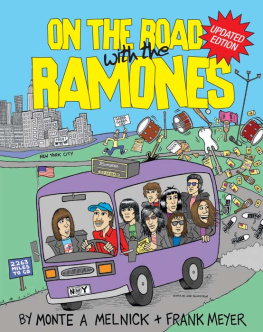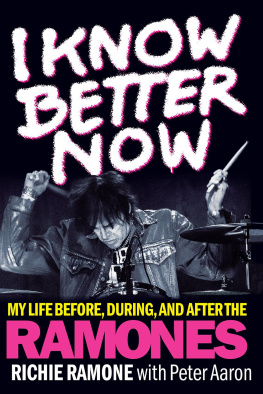
Ramones
Praise for the series:
Passionate, obsessive, and smartNylon
Religious tracts for the rocknroll faithfulBoldtype
Each volume has a distinct, almost militantly personal take on a beloved long-player ... the books that have resulted are like the albums themselvesfilled with moments of shimmering beauty, forgivable flaws, and stubborn eccentricityTracks Magazine
At their best, these books make rich, thought-provoking arguments for the song collections at handThe Philadelphia Inquirer
Reading about rock isnt quite the same as listening to it, but this series comes pretty damn closeNeon NYC
The sort of great idea you cant believe hasnt been done beforeBoston Phoenix
For reviews of individual titles in the series, please visit our website at www.continuumbooks.com
Ramones

Nicholas Rombes

2011
Continuum International Publishing Group
80 Maiden Lane, Suite 704, New York NY 10038
The Tower Building, 11 York Road, London SE1 7NX
www.continuumbooks.com
Copyright 2005 by Nicholas Rombes
All rights reserved. No part of this book may be
reproduced, stored in a retrieval system, or transmitted
in any form or by any means, electronic, mechanical,
photocopying, recording, or otherwise, without the
written permission of the publishers.
Library of Congress Cataloging-in-Publication Data
Rombes, Nicholas.
Ramones / Nicholas Rombes.
p. cm.(33 1/3)
Includes bibliographical references.
eISBN-13: 978-1-4411-8327-9
1. Ramones (Musical Group). Ramones. I. Title. II. Series.
ML 421.R32R65 2005
782.421660922dc22
2004024081
Printed and bound in the United States of America
Contents
Also available in this series:
Dusty in Memphis, by Warren Zanes
Forever Changes, by Andrew Hultkrans
Harvest, by Sam Inglis
The Kinks Are The Village Green Preservation Society,
by Andy Miller
Meat Is Murder, by Joe Pernice
The Piper at the Gates of Dawn, by John Cavanagh
Abba Gold, by Elisabeth Vincentelli
Electric Lady land, by John Perry
Unknown Pleasures, by Chris Ott
Sign O the Times, by Michaelangelo Matos
The Velvet Underground and Nico, by Joe Harvard
Let It Be, by Steve Matteo
Live at the Apollo, by Douglas Wolk
Aqualung, by Allan Moore
OK Computer, by Dai Griffiths
Let It Be, by Colin Meloy
Led Zeppelin IV, by Erik Davis
Armed Forces, by Franklin Bruno
Exile on Main Street, by Bill Janovitz
Grace, by Daphne Brooks
Loveless, by Mike McGonigal
Murmur, by J. Niimi
Pet Sounds, by Jim Fusilli
Forthcoming in this series:
Born in the USA, by Geoff Himes
Endtroducing..., by Eliot Wilder
In the Aeroplane over the Sea, by Kim Cooper
London Calling, by David Ulin
Low, by Hugo Wilcken
Kick out the Jams, by Don McLeese
The Notorious Byrd Brothers, by Ric Menck
Acknowledgments
I would like to thank the staff of both the University of Michigans Harlan Hatcher Graduate Library and the Music Library for help in tracking down materials from the mid-1970s. In many ways, punk remains outside the official history often archived in libraries, so I am especially thankful to the many private collectors who shared their material with me.
Many thanks to Craig Leon for taking the time out of his schedule to answer my questions about the albums production, and to Fredric Shore, Maggie Carson, and Juliusz Kossakowski, whose film Punking Out provides invaluable footage of key bands, including the Ramones, at CBGB as the punk scene was emerging.
I am thankful to my teachers over the years who have taught me that no cultural text can be studied without tuning in to its material history, especially James Berta and Carla Mulford. I have also enjoyed conversations about punk with Stephen Manning over the years.
Thanks to David Barker at Continuum for his support and goodwill.
My love and thanks to my mother and father, Nicholas and Diane, for a wonderful childhood and home, a place where I was encouraged to create. This book took me back to 1975, and to memories of my sister, Kori.
Finally, my deepest love to Niko and Maddy, who tolerated dads musical obsessions during the writing of this book. And to my wife Lisa, my endless love, gratitude, and respect. This book is for you, for everything.
You even shatter the sensations of time and space into split seconds and instant replays.
Max, in Network
After hearing [Ramones], everything else sounded impossibly slow.
Jon Savage, Englands Dreaming
The Outsider is a man who has awakened to chaos.
Colin Wilson, The Outsider
No subculture has sought with more grim determination than punks to detach itself from the taken-for-granted landscape of normalized forms, nor to bring down upon itself such vehement disapproval.
Dick Hebdige, Subculture:
The Meaning of Style
Ramones in Their Time
Ramones is either the last great modern record, or the first great postmodern one. Fully aware of its status as pop culture, it nonetheless has unironic aspirations toward art. The Ramones themselvesmaintaining an unchanging image for nearly thirty years in a culture that values nothing so much as changewere too serious and enduring to be dismissed as cartoonish, yet too fun to be embraced as serious.
As other bands self-destructed, seduced by their own madness or by the trappings of fame, the Ramones remained troubadours of punk, and, for the better part of their career as a group, generated an unchanging sound in the face of rapidly evolving trends. They were deeply aware of the Dark Side of longevitythe Beatles, the Rolling Stones, and The Who all provided templates of the path not to be taken, as the early reckless power of their work gradually gave way to self-perpetuating indulgence and excess, signaled by long, dramatic concept songs and albums whose virtuosity practically demanded worship.
The quality that insured the Ramones first album would become one of the most important records in modern rock was the same quality that guaranteed they would never have mainstream success in their time: a unified vision, the force of a single idea. There is a purity to Ramones that is almost overwhelming and frightening. Basically, the Ramones are the only punk group from the 1970s to have maintained their vision for so long, without compromisea vision fully and completely expressed on their very first album. In America, there is a skepticism and wariness about any artistic or cultural form that doesnt evolve, that doesnt grow. There is no more damning critique than the charge of repeating yourself. And yet punk was precisely about repetition; its art lay in the rejection of elaboration. And nowhere is this more evident than on the Ramones first album, whose unforgiving and fearful symmetry announced the arrival of a sound so pure it did not require change.
Next page










